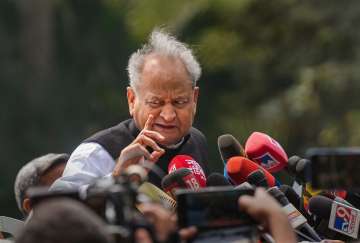Ahead of election, Gehlot govt's Right to Health Bill passed in Rajasthan Assembly
According to the provisions in every resident in Rajasthan will have the right to emergency treatment and care "without prepayment" at any "public health institution, health care establishment and designated health care centers.

Ahead of the crucial election, Gehlot government's ambitious bill that gives every resident the right to free emergency treatment at public or designated private hospitals was passed in the Rajasthan Assembly on Tuesday.
Now, every resident in Rajasthan will have the right to emergency treatment and care "without prepayment" at any "public health institution, health care establishment and designated health care centres", the provisions of the Rajasthan Right to Health Bill, 2022, suggested.
Before the bill was amended following recommendations by a select committee, the draft mentioned "any health care provider, establishment or facility, including private provider, establishment or facility, public health institution, health care establishment and designated health care centres, qualified".
The select committee omitted this part in its report and introduced in its place "public health institution, health care establishment and designated health care centres".
According to the amended bill that was passed, "designated health care centres" means health care centres as prescribed in the rules.
The rules are yet to be framed. The bill defines a "health care establishment" as the whole or any part of a public or private institution, facility, building or place operated to provide health care.
If a patient does not pay the charges after emergency care, stabilisation and referral, the government will reimburse the health care provider.
Protests by doctors
Introduced last September and sent to the select committee, the bill had sparked protests from doctors operating private hospitals and nursing homes.
The bill, which was passed by voice vote, also has a provision to impose fines up to Rs 10,000 on contravening any rule for first offenders and up to Rs 25,000 for subsequent contraventions.
A patient, during emergency treatment such as for accidents, emergencies due to snake or animal bite and any other, as decided by the State Health Authority, will be treated without prepayment by public health institutions, health care establishments and designated health care centres qualified to provide such care or treatment accordantly to their level of health care.
No healthcare provider can delay the treatment merely on the grounds of receiving police clearance. Replying during a debate, Health Minister Parsardi Lal Meena said the government is committed to providing health care to the people and the bill looks after public interest.
There have been complaints that some private facilities refused treatment even to Chiranjeevi Health Insurance Scheme card holders, the minister said.
According to Meena, the new bill will ensure that such practices are stopped and every patient, even if they don't hold a Chiranjeevi scheme card, can get free treatment at the designated facilities.
As part of the Chiranjeevi Health Insurance Scheme, the Rajasthan government provides health insurance of Rs 10 lakh and also bears the expense for organ transplants. Chief Minister Ashok Gehlot in his budget speech announced to increase this amount to Rs 25 lakh.
Commenting on the agitation, the minister said all suggestions, including those from the doctors, in the select committee report have been accepted.
"The doctors are agitating despite their suggestions being accepted. This is not justified. They are demanding withdrawal of the bill, is it justified?" he asked.
Meena added that Rajasthan is becoming a model state in the health care and the government spends seven per cent of the state budget on the sector.
"The Right to Health Bill is in the interest of the public. The state government had sent this bill to the select committee on the suggestion of the members of the House. The suggestions, which were received by members of the select committee and doctors, have been included in the bill," Meena said.
Speaking during the debate earlier, Deputy Leader of Opposition Rajendra Rathore said all stakeholders should move together.
He suggested that the bill be applied to 50-bed multi-specialty hospitals as these have all facilities, adding that there should be a single-window mechanism for grievance redress.
In response, Meena said Rathore's suggestions would be incorporated while framing the rules. The Opposition BJP also staged a walkout during Zero Hour, condemning police action against the agitating private doctors.
The police used water cannons to disperse private doctors protesting against the bill as they tried to march towards the assembly.
The doctors have been agitating against the bill, claiming that it would increase "bureaucratic interference".
(With PTI input)